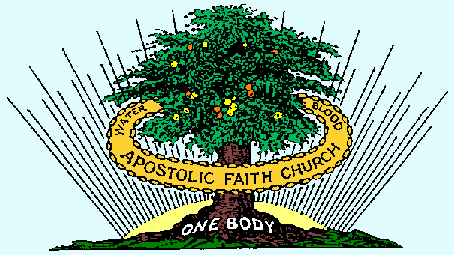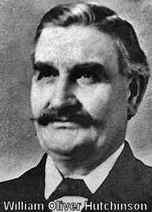
Our Church History
The great Welsh Revival at the turn of the century in 1904 saw 100,000 people coming to Christ. This was quickly followed by the Azuza Street Revival in Los Angeles in 1906. Both these great outpourings saw a rediscovery of the Gifts of the Holy Spirit but sadly many people were slow to accept the manifest gifts of the Holy Spirit. The result was that many men and women struggled to find freedom and acceptance in many of the established Churches of the day and for one reason or another they had to leave. Conferences were organised so that those who found rejection elsewhere could meet and encourage one another as they openly practiced the gifts of the Holy Spirit. One such man was William Oliver Hutchinson. Having been greatly impacted by the Welsh Revival and Azuza Street he prayed that God would give him somewhere where he could freely practice the Gifts of the Holy Spirit without reproach.
Led By God
 William records how after praying for somewhere to hold meetings he found himself
surrounded by angels who led him to a plot of waste land located on a substantial
and elevated site in Winton, Bournemouth. He had only nine pence in his pocket but
took out a 99 year lease on the plot which was set back from Muscliffe Road near
to its junction with what is now Castle Road. Without him noticing the owner wrote
a clause into the lease giving William the right to buy after an eight year period.
Gifts of money started to come William's way. In 1907 he commenced Tent meetings
on the site whilst, with the help of a sympathetic bank manager, he built Emmanuel
Hall as the first Pentecostal Church in the United Kingdom. To this day a memorial
stone in the entrance bears the inscription "In The Beginning God 1908." William
was greatly impacted by the Welsh and Azuza Street revivals and indeed in one of
the Welsh Revival meetings he experienced a vision in which he saw three balls of
fire resting on his head. Shortly thereafter he came into the experience of being
baptised in the Holy Spirit and began to speak in tongues. In 1908 he attended Pentecostal
convention meetings in Sunderland, England, and was prayed for by Anglican Priest
Rev. A. A. Boddy and received further blessing. Later in 1908 Emmanuel Hall was
opened and the worshipping group called themselves The Apostolic Faith Assembly.
The Church continued to grow and on 20th October 1910 Emmanuel Hall was registered
as the Church Headquarters and as a place of worship. In 1910 the Church was named
the Apostolic Faith Church and published its constitution in 1916 which was duly
registered by Deed Poll on August 30th of that year.
William records how after praying for somewhere to hold meetings he found himself
surrounded by angels who led him to a plot of waste land located on a substantial
and elevated site in Winton, Bournemouth. He had only nine pence in his pocket but
took out a 99 year lease on the plot which was set back from Muscliffe Road near
to its junction with what is now Castle Road. Without him noticing the owner wrote
a clause into the lease giving William the right to buy after an eight year period.
Gifts of money started to come William's way. In 1907 he commenced Tent meetings
on the site whilst, with the help of a sympathetic bank manager, he built Emmanuel
Hall as the first Pentecostal Church in the United Kingdom. To this day a memorial
stone in the entrance bears the inscription "In The Beginning God 1908." William
was greatly impacted by the Welsh and Azuza Street revivals and indeed in one of
the Welsh Revival meetings he experienced a vision in which he saw three balls of
fire resting on his head. Shortly thereafter he came into the experience of being
baptised in the Holy Spirit and began to speak in tongues. In 1908 he attended Pentecostal
convention meetings in Sunderland, England, and was prayed for by Anglican Priest
Rev. A. A. Boddy and received further blessing. Later in 1908 Emmanuel Hall was
opened and the worshipping group called themselves The Apostolic Faith Assembly.
The Church continued to grow and on 20th October 1910 Emmanuel Hall was registered
as the Church Headquarters and as a place of worship. In 1910 the Church was named
the Apostolic Faith Church and published its constitution in 1916 which was duly
registered by Deed Poll on August 30th of that year.
Fire Of Revival Falls
The Church saw rapid growth as revival fire fell causing many to come to faith. Meetings were marked by many divine healings and tangible outpourings of the gifts of the Holy Spirit. People travelled, and even walked, for miles to attend services. In the 1920's in particular, droves of people walked or cycled from other parts of England to be blessed and to be healed. William played host to growing numbers of Pastors who in some cases would establish their own versions of the Church. Des Cartwright writes, “Separate Pentecostal groups began to emerge in Britain. The first was the Apostolic Faith Church of William Oliver Hutchinson. Next came what was to become the Elim Pentecostal Church that George Jeffrey's first founded in Ireland in 1915. This was followed by the Apostolic Church established in Penygroes, Wales in 1916 by Daniel Powell Williams. He had initially worked with William Hutchinson. Many of the remaining Pentecostal Churches came together in Birmingham in 1924 to form the Assemblies of God of Great Britain and Ireland. Each of these groups began to use their own magazines. The Apostolic Faith Church in Bournemouth issued the first of these in January 1910. This was entitled Showers of Blessing." Pastor Hutchinson died in 1928 leaving a great legacy to those who followed on and who today continue to carry the torch of the Apostolic Faith Church that he founded.
The British Broadcasting Corporation Records History
The historic record of the BBC records that the first Pentecostal Church in the UK was founded by William Oliver Hutchinson in 1908 at the Emmanuel Mission Hall, Bournemouth. It became the headquarters of a network of Pentecostal Churches which became known as the Apostolic Faith Church.
The Church Is Planted On The African Continent
The work and reputation of the Church expanded rapidly. In 1911 William Oliver Hutchinson visited Africa himself to establish the Apostolic Faith Church, and this was followed by brother and sister Hicks-Roderick being sent from Wales with the task of establishing the work of the Church there. They were followed by Mr and Mrs James Brooke and many others including the present International Chief Overseer of the Church, the Rev. Duncan Lee and his wife Jean. The Church got establish in South Africa, with Daveyton, Johannesburg, as its former African Headquarters. Today the work has expanded northwards to cover eleven African Countries with new works in Tanzania through expansion work from Zambia. The ministry work has since been demarcated into two regions, with the countries to the South of the Limpopo River, namely South Africa, Eswatini formerly Swaziland, Lesotho and Mozambique forming the South of Limpopo Region and those countries to the North of the Limpopo River namely Angola, Botswana, D. R. Congo, Namibia, Malawi, Zambia and Zimbabwe. Daveyton, Johannesburg, South Africa now stands as the Headquarters of the Church in the Southern Region and Livingstone, Zambia has been designated as the Headquarters of the Church in the Northern Region.







